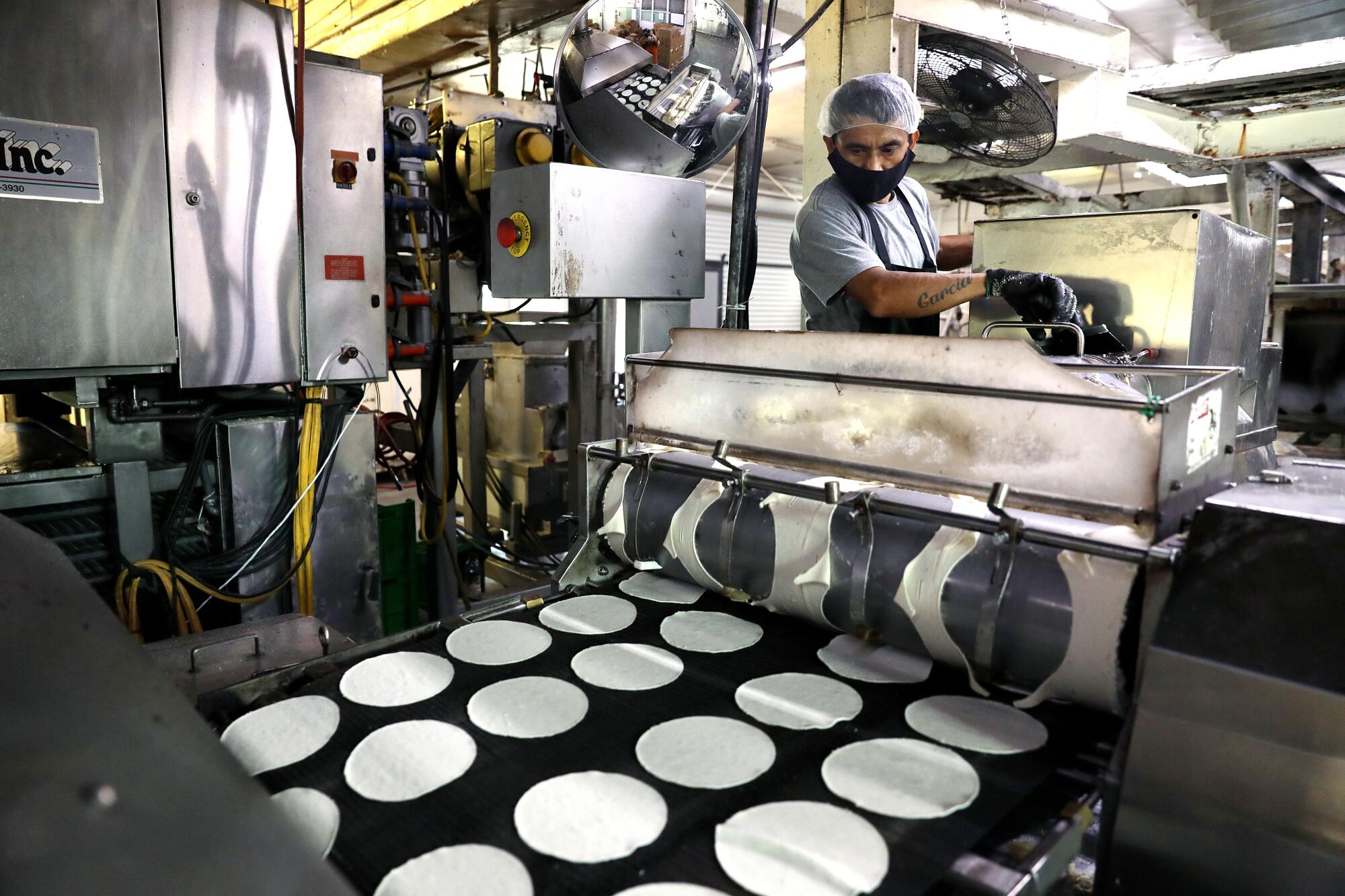
- Share via
There was a wearied pride in Fernando Ruiz’s voice as he led me on a tour of his family’s flour tortilla plant, La Gloria Foods in Boyle Heights.
We started in the back, where a massive sifter tossed flour inside a machine that spat out perfectly formed balls of dough. Two workers fed the orbs into a pneumatic press that smushed them into flat discs. Those raw tortillas slipped onto a seven-tiered conveyor belt that passed through an oven. The cooked results moved down the length of the factory, to men and women who stuffed them into bags decorated with La Gloria’s festive logo.
On a good day, these machines can produce 10,000 dozen packs — 120,000 tortillas. That’s on top of the nearly half a million corn tortillas La Gloria makes daily at a separate facility less than half a mile away that also houses its headquarters and a small store.
“We used to be able to do more,” said Ruiz, the company’s production manager. He spoke over a symphony of mechanical whirs and groans. “Pre-pandemic, we were making tortillas nearly 24 hours a day. Right now, we’re just at 16 hours.”
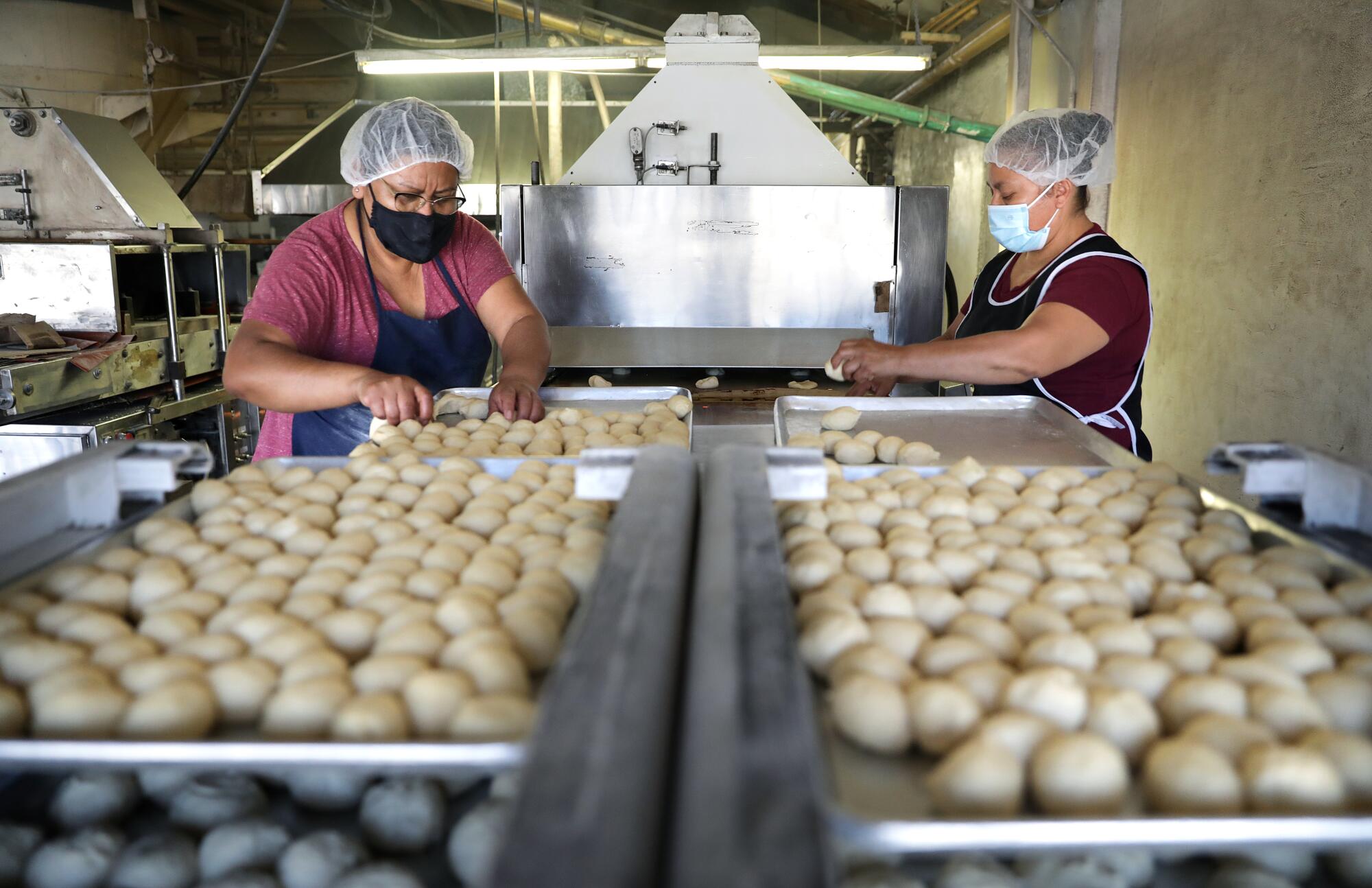
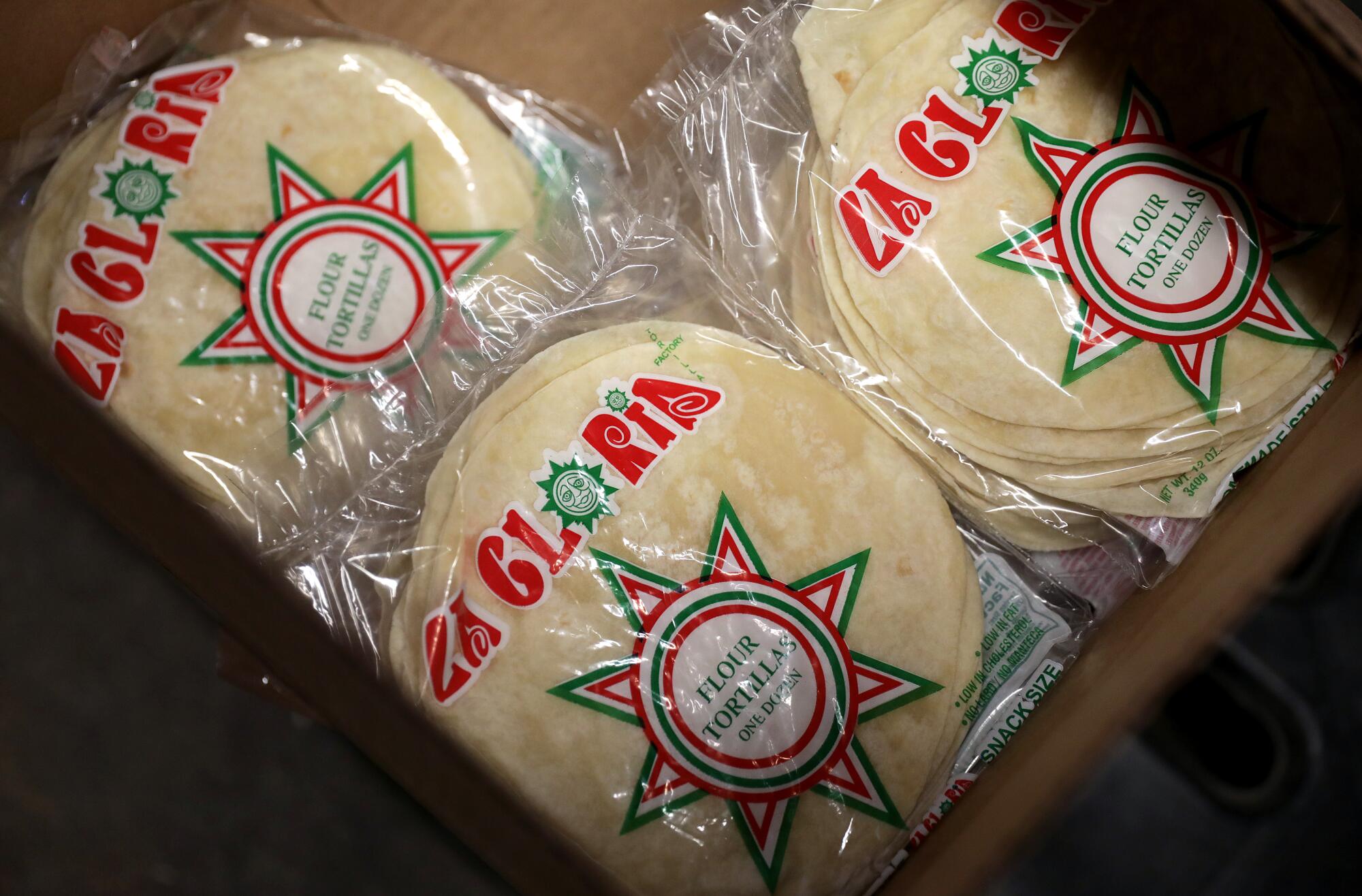
Looking on was his aunt and boss, La Gloria President Maria Vera, along with another aunt and two cousins. Ruiz’s mom was on the way. The family has hosted thousands of visitors ever since Vera’s father and mother, Manuel and Antonia Behar, bought the original La Gloria in 1954 just down the street and made all the tortillas themselves.
But even the masks that Ruiz and his relatives wore couldn’t hide their melancholy. They gathered to take in what might be one of the last factory tours. La Gloria is in danger of closing — but the culprit isn’t the economic ravages of COVID-19, they say. It’s the Los Angeles Department of Public Works.
For the last six years, La Gloria has waged a bitter battle with the agency over the fate of its flour tortilla machines. The city acquired the Quonset hut that houses them via eminent domain in 2015 as part of a long-planned roundabout at Cinco Puntos, the historic intersection where Boyle Heights turns into East Los Angeles. La Gloria received $2.2 million for the building and was also entitled to relocation fees per California law.
La Gloria asked for $4.2 million, citing the complexity of dismantling and transporting the flour tortilla lines, plus a full-scale rewiring and rejiggering of the remaining factory to accommodate the machines. The Department of Public Works countered with $3.1 million, then $2.5 million, before suggesting it could move everything for just $246,000. A retired judge oversaw mediation that led to a 2019 agreement that stated the city would give La Gloria $1.88 million, plus pay for either new tortilla machines or the relocation of the old ones upon completion of a bidding process.
But the dispute continued, and the next round happens Wednesday at a Zoom hearing before the department’s Relocation Appeals Board. The city will suggest a new figure for La Gloria’s relocation fees.
Zero.
A staff report recommended the amount because it claimed La Gloria violated federal law by being “non-cooperative” in refusing “to allow reasonable inspections” to determine correct relocation costs, allegations the company denies.
Through Department of Public Works communications director Mary Nemick, the city of Los Angeles declined to comment.
La Gloria learned of the staff report about a week ago. Flour tortillas make up 50% of its revenue. Without any relocation fees, the company says, it’s not just its ability to make flour tortillas that gets impacted — the corn-tortilla business would go under, too.
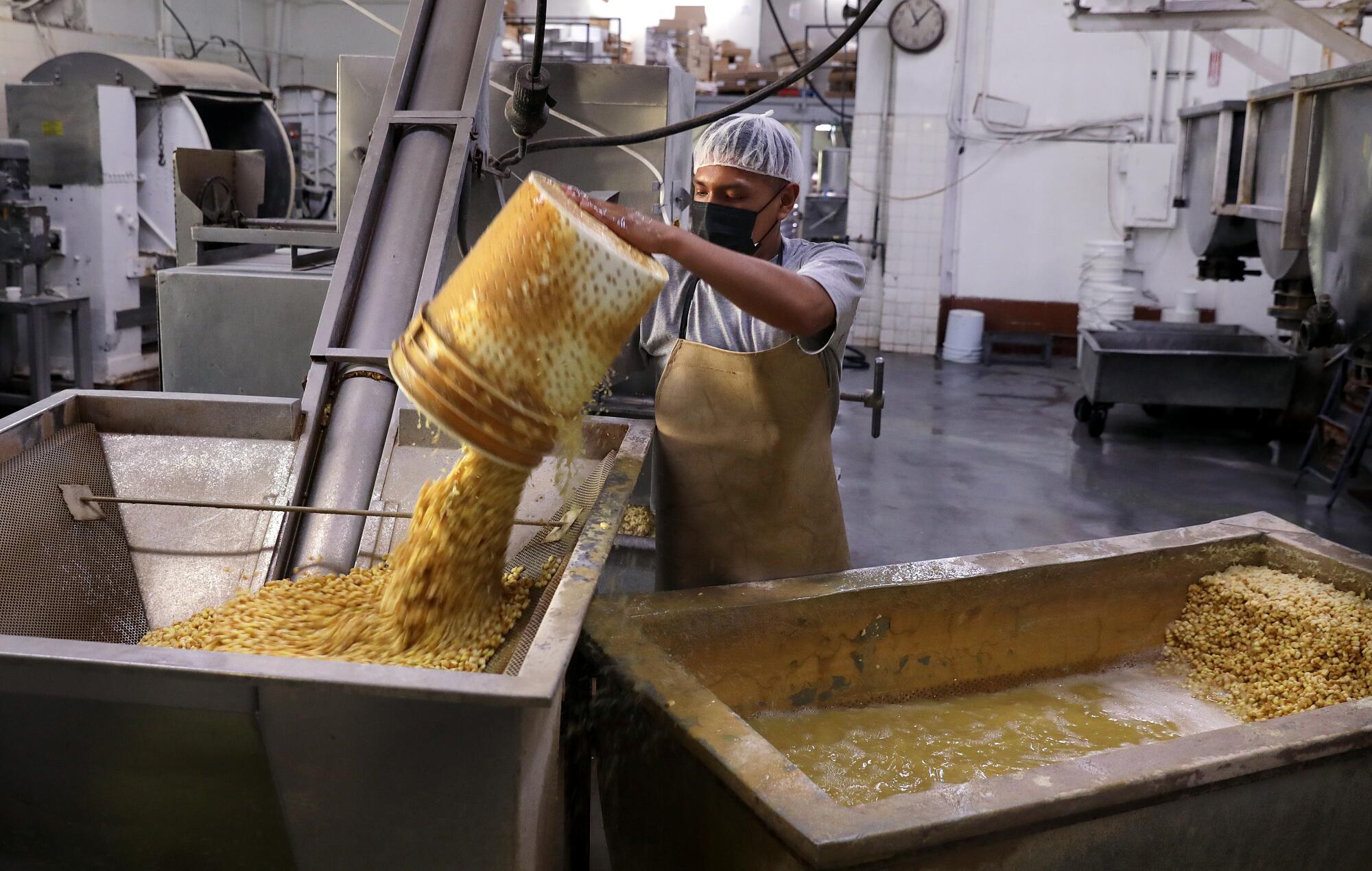
“It’s not as simple as just getting a bunch of U-Hauls and loading everything up,” said Ruiz, 46.
Now, I know what y’all are thinking: $4 million to move machines that make tortillas? You could’ve smacked me with a frozen burrito when I first heard that amount. I mean, can’t you just hire an army of tías at a tenth of the cost?
But here’s the thing: You can’t if you want to make tortillas on the scale of La Gloria.
The sifter looks like a refrigerator that just went through a growth spurt. The conveyor belt is the length of a yacht. The oven that cooks the tortillas is about the size of a teenage stegosaurus. All the parts together make a Rube Goldberg machine seem as complex as flipping a quarter.
L.A.’s Department of Public Works knows this — why else would it have originally offered La Gloria $3.1 million in relocation fees? To see the offer go from seven figures to none seems personal.
“The city must think we’re a bunch of dumb Mexicans,” said Cynthia Vera, a first-grade teacher who’s Maria’s daughter and helps with public relations. She’s particularly enraged by an 2015 internal staff email sent by a city engineer about La Gloria’s requested relocation fees. In it, the author joked, “It sounds like they may have misplaced a decimal point. Where are they moving to ... Beverly Hills?”
Maria Vera has worked at La Gloria since she was a little girl who translated everything from mail to insurance policies for her Spanish-speaking parents. Now 73, she remembered how friendly city staffers walked her and her dad through permit applications to get the flour tortilla plant up and running when she was still a student at Belvedere Elementary.
“When we first formed La Gloria, the city helped us,” she said softly but matter-of-factly. “Now, the city wants to take it away. ”
My La Gloria tour ended in a former apartment complex next door to the corn tortilla plant. This is where Vera and her two sisters grew up, where her father lived until he passed away in 1990 at 81, getting up every day at 2 in the morning to start production.
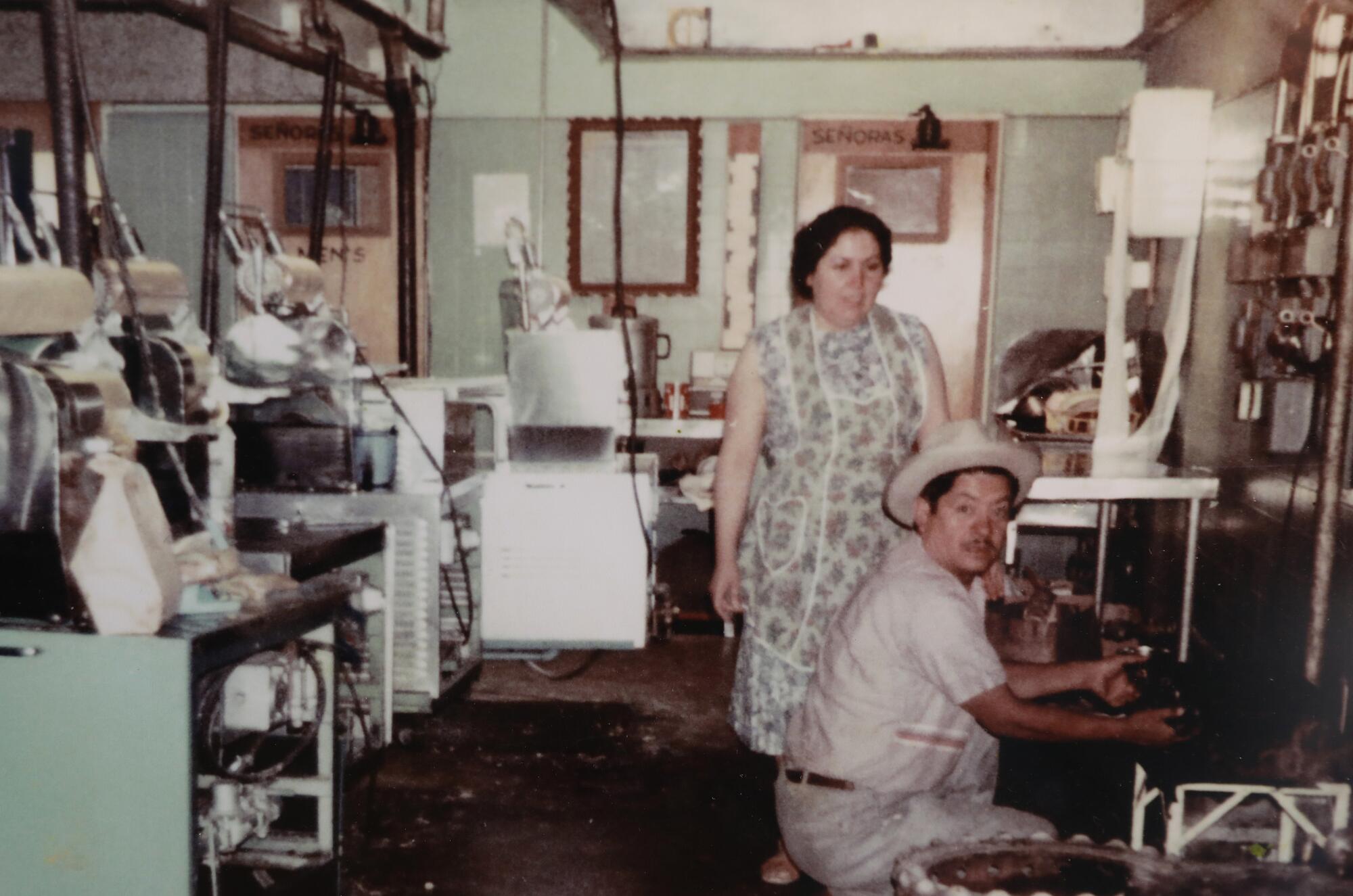
Today, the apartment complex is La Gloria’s offices. Eleven family members work full time, while the fourth generation does grunt work during their summer vacations as a reminder of where the family came from.
“My dad would always tell me, ‘Don’t let the workers see you sitting down, because that’ll tell them you’re lazy,’” said Vera, looking at a framed photo of her parents at the original La Gloria.
Manuel Behar came to Los Angeles in 1954 after opening tortillerias in Mexico City, Tijuana and Texas. He had always wanted to come to Los Angeles, and he found a city whose appetite for tortillas was insatiable.
With his wife, the Mexican immigrants created a Boyle Heights institution. Ronald Reagan and former Los Angeles Mayor Antonio Villaraigosa were customers. Behar’s innovations in tortilla production earned him a posthumous spot in the Tortilla Industry Assn.’s Hall of Fame in 2009 for creating “one of the first mass-producing tortilla companies in the country,” according to his plaque.
“The city doesn’t realize how much history is here,” said Cynthia Vera. “They think that we can just start over. But this is our family. Losing it is not an option for my mom.”
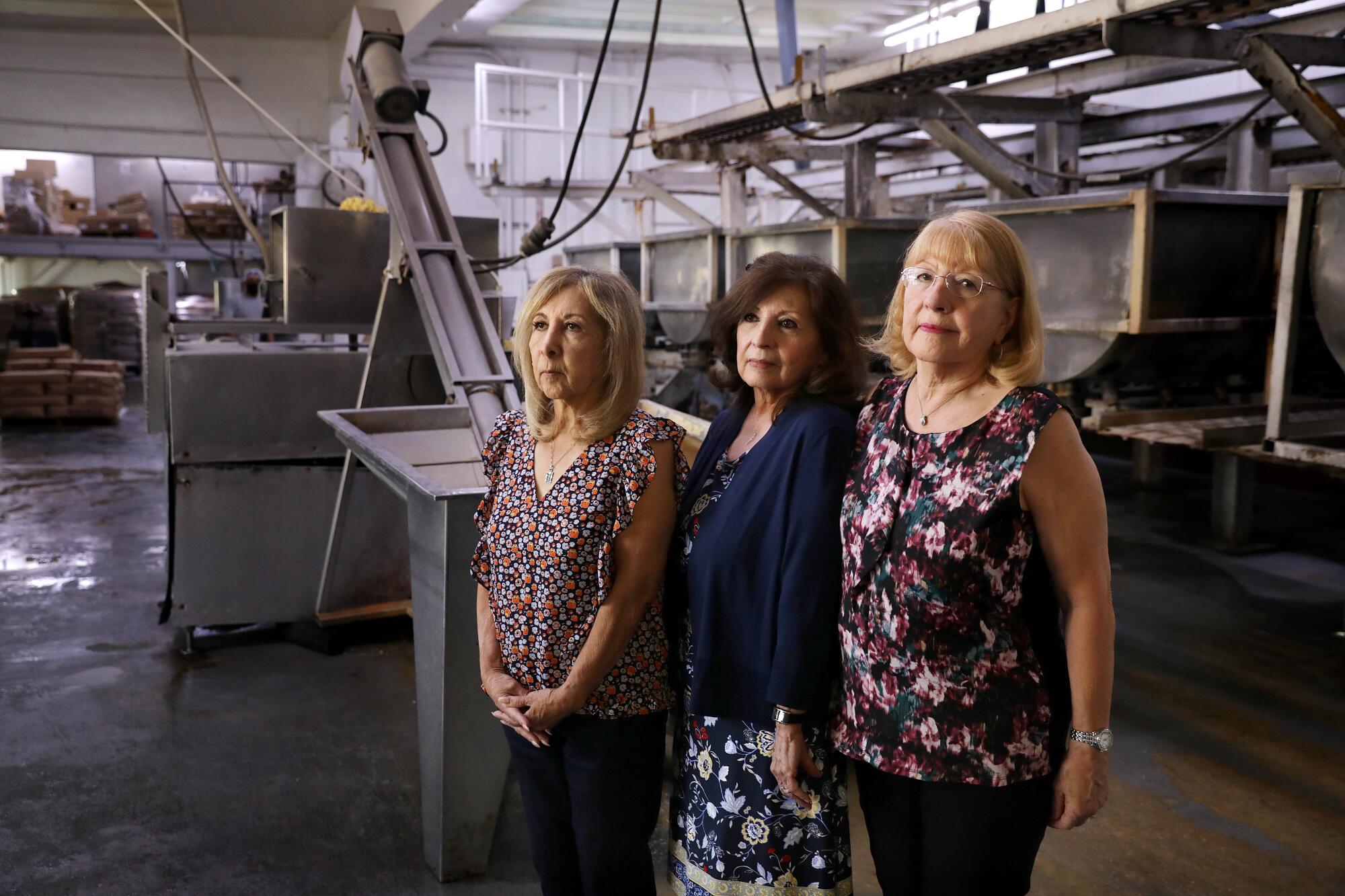
Maria Vera owns La Gloria along with her two sisters, Maria Vazquez and Sylvia Ruiz. They’ve never thought of selling.
“I didn’t want all of my father’s effort to go nowhere,” she said. “He gave everything.”
Vera hopes the public works appeal board rejects the nada in relocation fees that the city of Los Angeles will argue La Gloria merits. But the family is worried, because they’ve been on the losing end with the city before.
Back in 2007, Metro laid tracks for its Gold Line extension through the Eastside right in front of La Gloria’s headquarters during the holiday season, the company’s busiest time of the year. Walk-up business has never been the same because customer parking is now essentially three spaces next to pallets at the headquarters. Big rigs can no longer enter the facility, which means La Gloria must unload supplies elsewhere.
“It’s been decades that we’ve been dealing with this,” Vera said. In her hands was a manila folder with more pictures of her parents and their business in the early days. “For the city, it’s very easy to take this away, but they don’t know the sweat and life and work here. At this point, we feel hopeless.”
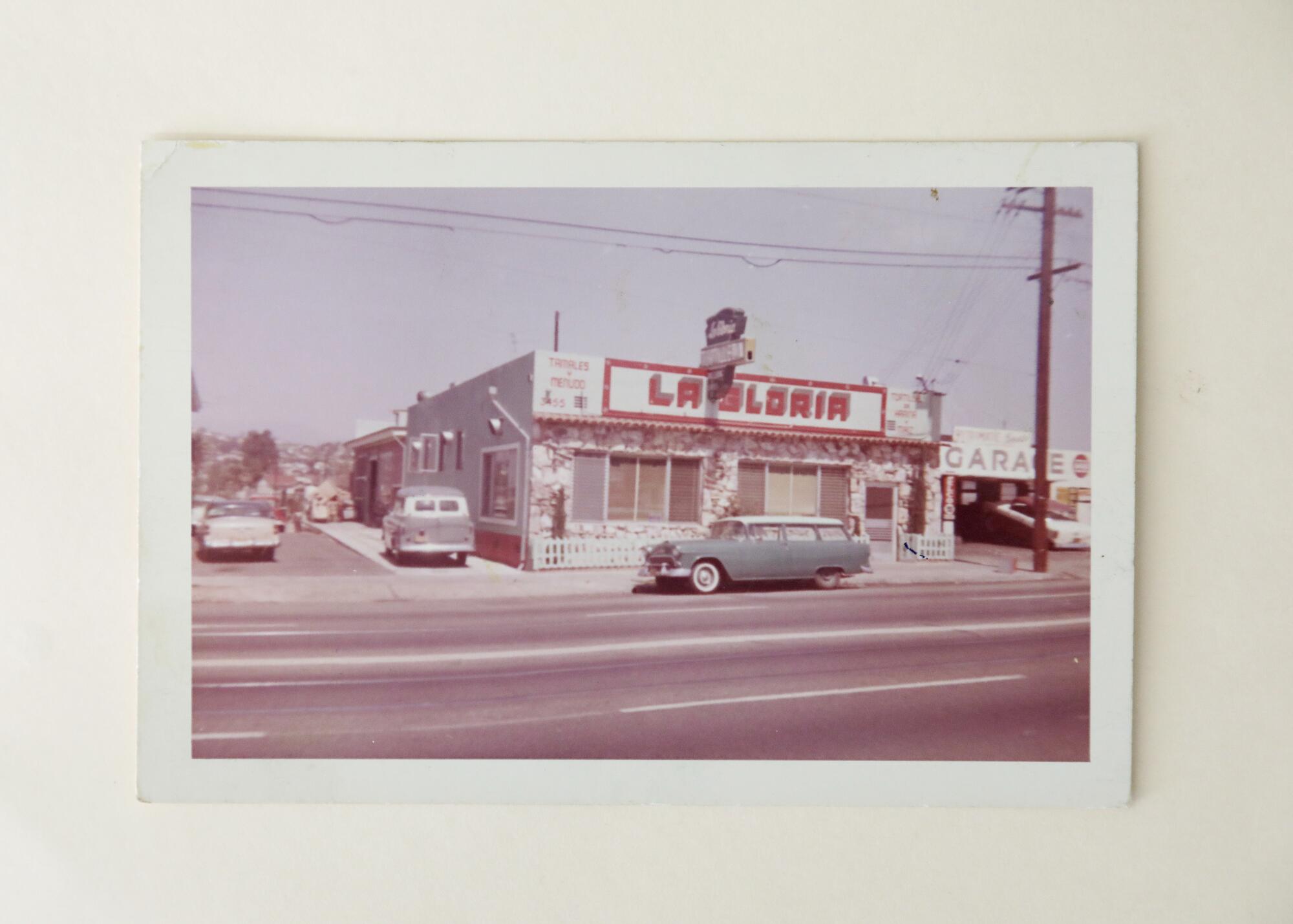
More to Read
Sign up for Essential California
The most important California stories and recommendations in your inbox every morning.
You may occasionally receive promotional content from the Los Angeles Times.















